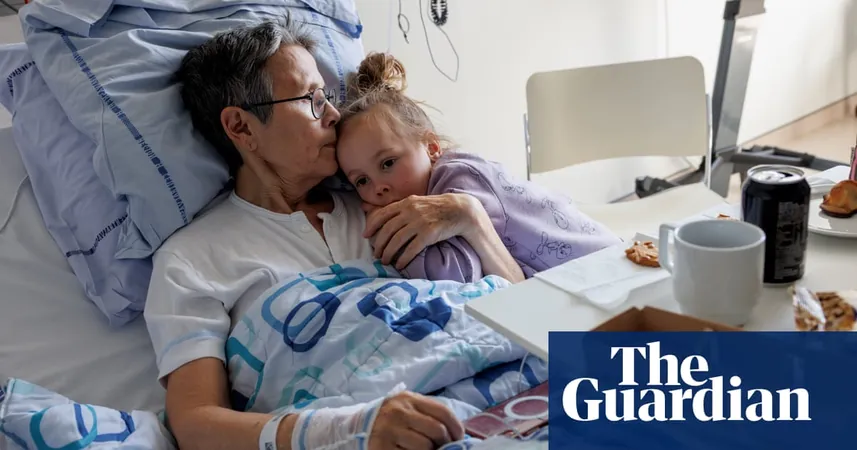
Inside Denmark's Palliative Care: Reimagining Death with Compassion
2025-04-22
Author: Arjun
At Hvidovre Hospital near Copenhagen, the atmosphere of the palliative care unit provides contrast to the typical sterile environment of a hospital. Here, it’s not just about alleviating physical pain; it's also about addressing the profound emotional fears surrounding death.
Meet René Damgaard, a 67-year-old patient nestled under soft sheets, surrounded by his beloved family. The open window invites the gentle sounds of nature into his room, while his niece, Mette, leans in closely, whispering promises of care and love as he prepares for his final journey. "You can let go now, René," she reassures him.
As discussions about end-of-life choices heat up in Denmark, including the proposal for medically assisted dying, palliative care is emerging as a compassionate alternative. I had the privilege to witness this for myself during my ten days in the palliative care unit in early 2024.
Unlike standard hospital wards that focus on curing disease, section 126 of Hvidovre Hospital is dedicated to providing solace and comfort to those facing terminal illness. Here, doctors and nurses specialize not only in managing pain but also in guiding patients and their families through the emotional labyrinth of saying goodbye.
Dr. Johan Randén, a veteran in the field, explains the complex reality of terminally ill patients. "Many arrive seeking relief from physical discomfort, yet they are often grappling with emotional burdens like anxiety and existential dread—what we term ‘total pain.’" This includes discussions about assisted dying, which can shift as patients receive extensive support and compassion.
Sigrid Nielsen, an experienced nurse, echoes Dr. Randén's insights: "It’s often healthy individuals advocating for assisted dying. The patients we see here are different; they want to live. They fight against the end with every fiber of their being." Every morning, the staff come together for patient updates, discussing their needs—ranging from severe emotional distress to logistical challenges for discharges.
René, battling aggressive cancer, symbolizes this struggle. His health deteriorated rapidly after a late diagnosis, leading him to the palliative care unit. Despite his frail condition, his spirit remains resilient as he engages in heartfelt conversations with Mette about family and regrets.
It’s not unusual for moments of profound emotional connection to emerge in the unit. One patient, Niels Abrahamsen, diagnosed with stomach cancer, embraces life’s pleasures, seeking high-quality coffee and comfort food, even sharing treats with the attentive nursing staff. His humor and zest for life shine through even in the face of terminal illness.
A different patient, Liv Simonsen, faces the hurdles of transitioning from optimism to the harsh realities of her cancer’s return. Despite a temporary setback, she is supported by a team that passionately advocates for her emotional and physical well-being.
In the palliative care unit, the staff emphasize understanding patients’ wishes. Dr. Randén notes, "No amount of tests will substitute for meaningful conversations about what matters most at the end of life. Patients must be heard and allowed to express their fears and desires." This ethos creates a nurturing environment wherein patients feel validated and cared for.
Yet not all encounters are easy. Some patients grapple with the reality of their endings, exhibiting resistance or denial. But the team works tirelessly to support both the patients and their families in understanding the final stages of life.
Unfortunately, as René’s health declines alarmingly due to pneumonia, the focus shifts to comfort in his final days, with the staff adjusting medications to ease his suffering. Moments of lucidity allow for important conversations and reflections on life as Mette encourages him to envision peaceful scenes from his past.
In a bittersweet end, René passes quietly, encircled by love and memories. His journey becomes a testament to the compassionate care offered in Denmark’s palliative system—where the fear of death is met with respect, dignity, and unwavering support.
As these stories unfold, they remind us that life—and death—can be navigated with grace, and that a well-facilitated farewell can provide solace not just for the patient, but for all those who remain.

 Brasil (PT)
Brasil (PT)
 Canada (EN)
Canada (EN)
 Chile (ES)
Chile (ES)
 Česko (CS)
Česko (CS)
 대한민국 (KO)
대한민국 (KO)
 España (ES)
España (ES)
 France (FR)
France (FR)
 Hong Kong (EN)
Hong Kong (EN)
 Italia (IT)
Italia (IT)
 日本 (JA)
日本 (JA)
 Magyarország (HU)
Magyarország (HU)
 Norge (NO)
Norge (NO)
 Polska (PL)
Polska (PL)
 Schweiz (DE)
Schweiz (DE)
 Singapore (EN)
Singapore (EN)
 Sverige (SV)
Sverige (SV)
 Suomi (FI)
Suomi (FI)
 Türkiye (TR)
Türkiye (TR)
 الإمارات العربية المتحدة (AR)
الإمارات العربية المتحدة (AR)